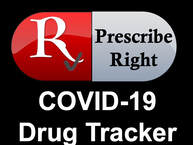|
Remdesivir
A researcher at the University of Chicago announced results from 113 patients that had participated in a trial comparing high dose and low dose remdesivir in patients with severe COVID-19 (NCT04292899). Most patients had a reduction of fever and were discharged after six days, suggesting 10 days of therapy is not required. Patients on ventilators were weaned off ventilators after one day of therapy. Data from the first 400 patients in the 2,400 patient trial was locked on 4/16/2020 and expected to be announced before the end of the month. Chinese researchers were evaluating remdesivir in two placebo controlled Phase III COVID-19 trials in patients with severe infections (NCT04257656) and mild-to-moderate infections (NCT04252664). Recruitment for the trials was slowed due to a requirement that patients had not been treated with another therapy within 30-days before entering the trial and a decrease in available patients. Many patients have already self-treated based on information they found on the Internet. The severe COVID-19 trial was terminated on 3/30/2020; 237 patients were enrolled in the trial and the study was completed on 4/10/2020. The mild-to-moderate infection trial was suspended on 4/10/2020 with 308 patients enrolled. The mild-to-moderate study is estimated to be completed on 4/27/2020. Gilead has stated it is up to the Chinese researchers on when the trial data will be presented or published. The result from the Gilead sponsored trial in patients with severe COVID-19 infections are estimated to be available in late April, while results from the mild-to-moderate trial is estimated to be available in May 2020. Results from the NAID sponsored trial are also expected to be available in May. Hydroxychloroquine and Chloroquine FEMA shipped 19 million hydroxychloroquine tablets in early April 2020 from the Federal stockpile. This would be enough to treat 1.3 to 1.6 million patients. An unreviewed, unedited article provided a retrospective review of 181 French patients hospitalized with hypoxemic pneumonia due to COVID-19; the addition of hydroxychloroquine to standard of care treatment did not reduce ICU admission or death by day seven after hospital admission compared to standard of care. Patients were excluded if they had received an antiviral during their hospitalization. In an unreviewed, unedited report of a 150 patient, Chinese trial, the addition of hydroxychloroquine to standard of care treatment did not result in a higher negative conversion rate compared to standard of care in patients hospitalized with COVID-19. Standard of care included antivirals in an unspecified number of patients. The authors stated the negative conversion was not improved when excluding patients that received an antiviral, but they did not specify the number of patients with or without another antiviral. Hydroxychloroquine did alleviate more symptoms when only patients that did not receive an antiviral were considered. In an unreviewed, unedited abstract, French researchers provided data on 1,061 patients not previously included in their initial reports of outcomes with 80 patients. There was no randomization or comparative group. Patients were treated with hydroxychloroquine and azithromycin for at least 3-days and followed for at least 9-days. The clinicians report a good clinical outcome and virological cure in 91.7% of patients. Brazilian researchers (NCT04323527) are evaluating two dosages of chloroquine plus azithromycin in 440 hospitalized patients with COVID-19 in a Phase IIb trial that began in March 2020. After an analysis of the first 81 patients (unreviewed, unedited report) revealed an increase in mortality in the high dose population due to QTc prolongation, recruitment for the higher dose was halted. Most patients in the trial (89.6%) were also receiving oseltamivir for suspected influenza. Both azithromycin and oseltamivir can also increase the QTc interval. Prescribe Right COVID-19 Drug Tracker We have added galidesivir to the tracker. Galidesivir is being evaluated by BioCryst (NCT03891420) in the treatment of COVID-19 or Yellow Fever in a 66 patient, Phase I, placebo-controlled, Brazilian trial that began in April 2020 and is expected to be completed at the end of May 2020. Our COVID-19 Drug Tracker is now monitoring 30 drugs and adding more each week. The drugs we track include:
But we are also staying atop developments with non-COVID-19 investigational drugs. We currently track 841 drugs, supported by 1,342 PubMed citations. This week we added vutrisiran, an RNAi Therapy for the treatment of TTR amyloidosis, and tozuleristide, a tumor-targeting optical imaging agent for use in fluorescence-guided surgery for pediatric central nervous system tumors. We’re making sure our subscribers can stay up to date with investigational drug therapies. See our subscription page for our latest offers. Comments are closed.
|
Stay informed, subscribe to the Prescribe Right Pharmaceutical Pipeline Tracker
Archives
January 2023
Categories |
Services |
Company |
Support |
© COPYRIGHT 2015. ALL RIGHTS RESERVED.
|


 RSS Feed
RSS Feed